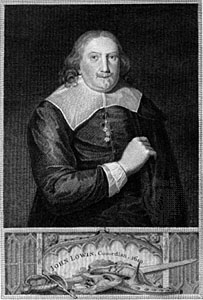John Lowin facts for kids
John Lowin (born in 1576, died in 1653) was a very important English actor during the time of William Shakespeare. He was known for playing many big roles in popular plays.
Contents
Early Life of John Lowin
John Lowin was born in London in 1576. His father was a tanner, someone who works with animal hides to make leather. When he was young, Lowin trained to be a goldsmith, a person who makes things out of gold.
In 1611, he even acted as a goldsmith named Leofstane in a special city show. This show was put on by the Goldsmiths' Company to celebrate one of their members becoming mayor. Lowin was called a "brother" of the company, which means he had a connection to them. He lived in Southwark, a part of London, where he got married in 1620.
John Lowin's Acting Career
Lowin started acting around 1602. He first performed with a group called Worcester's Men at Rose Theatre in London. By late 1603, he joined the famous King's Men, which was William Shakespeare's acting company. He likely became a full member of the King's Men in 1604.
Lowin quickly became an important actor in the company. He appeared in the introductions of plays, acting as himself alongside other famous actors like Richard Burbage. He was listed in the cast for many well-known plays. These included Sejanus (1603), Volpone (1605), The Alchemist (1610), and Catiline (1611) by Ben Jonson. He also acted in Bonduca and Valentinian (around 1613) by John Fletcher, and The Duchess of Malfi (around 1614) by John Webster.
Lowin's Major Roles
John Lowin was a very skilled actor. In the early 1600s, only about twenty roles in plays were super long, with over 800 lines. Only three plays had two such big roles: Shakespeare's Othello and Jonson's Volpone and The Alchemist.
Richard Burbage played the main character in these plays for the King's Men. Lowin often played the second most important role. For example, he played Bosola to Burbage's Ferdinand in The Duchess of Malfi. It is very likely that Lowin played Iago to Burbage's Othello, Mosca to his Volpone, and Subtle to his Face. These were all very challenging and important parts.
Later Years and Theaters
In 1630, after the death of John Heminges, another important actor, Lowin bought a share in the Globe and Blackfriars Theatres. This meant he owned a part of these famous theaters.
Lowin, along with actor Joseph Taylor, took over many of the jobs Heminges used to do. They managed the company's money and dealt with the royal court. In 1633, Lowin was told off by Sir Henry Herbert, who was in charge of plays, for putting on a play without getting it approved first.
Theaters in England were closed in 1642. After this, Lowin might have run an inn called the Three Pigeons. He passed away in 1653 at the age of 76.
Plays Lowin Acted In
Lowin was one of the ten King's Men actors who signed the dedication for a collection of plays by Beaumont and Fletcher in 1647. His name is mentioned in the cast lists for 21 different plays in a later collection from 1679. This is more than any other actor!
|
|
Lowin was a large and strong-looking man, as shown in his portrait at the Ashmolean Museum. He was often known for playing funny characters who were a bit rough but honest. People believe he played famous roles like Falstaff and Epicure Mammon in The Alchemist. He is also thought to have been the first actor to play Bosola in The Duchess of Malfi and the main character in Shakespeare and Fletcher's Henry VIII.
Lowin's Legacy
John Lowin wrote one known work, a short pamphlet called Conclusions upon Dances. It was printed in 1607. This pamphlet talked about good and bad examples of dances mentioned in the Bible.
 | Emma Amos |
 | Edward Mitchell Bannister |
 | Larry D. Alexander |
 | Ernie Barnes |


